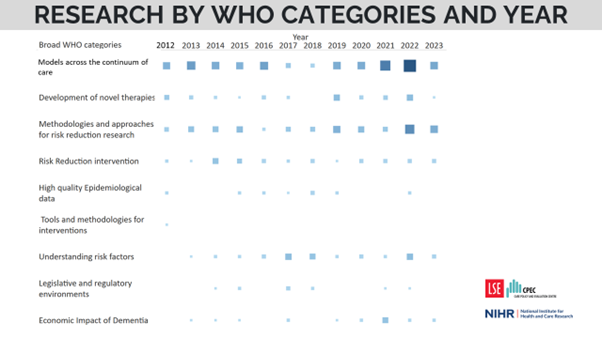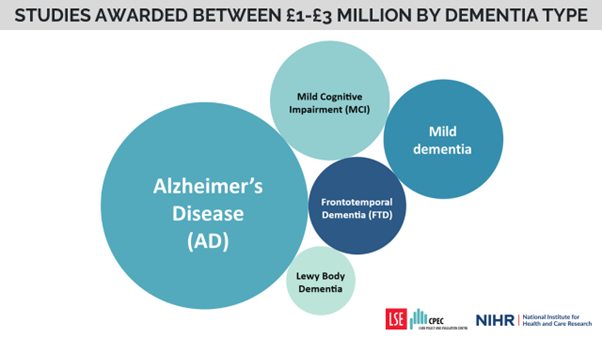Navigating the vast field of dementia research often resembles a complex puzzle. This puzzle starts at the cellular level, extending to people living with dementia, their families and wider communities, and on to the health, social care, housing and other systems that provide treatment and support. With a plethora of funding organisations, research programmes, and initiatives at play, it is challenging to get a comprehensive view of the field. Spotting gaps and formulating priorities within the research landscape can be particularly difficult.
The puzzling dementia research landscape
With continued prioritisation and funding of dementia research in the UK – across many public and charitable funding bodies – it becomes harder still to gain a strategic view of that landscape. Bodies such as the National Institute for Health and Care Research (NIHR), UK Research and Innovation (UKRI), Alzheimer’s Society and Alzheimer’s Research UK have all committed substantially more resources to dementia research in recent years. This raises many pertinent questions, including:
- What is the balance between basic science and research that focuses on care delivery?
- How is the research community dividing its efforts between studies of people with dementia living in care homes and those living independently?
- What studies are looking at the challenges faced by the health and social care workforce?
- Is enough research looking at prevention?
- What research attention is being given to support for overworked carers?
Systematic reviews and meta-analyses are traditional tools for understanding the breadth and depth of the field. But to be feasible, such studies necessarily have a narrow focus on particular topics. There is rapidly growing evidence about so many aspects of dementia, generated by researchers from many different disciplines, and it is hard to keep up with what is going on without and overarching view.
Consolidating research: Making sense of the puzzle
A team of researchers at the Care Policy and Evaluation Centre (CPEC) at the London School of Economics and Political Science has developed a UK-focused mapping of dementia research (RESIDE) which is a step in this direction. Funded largely by CPEC itself, with some support from the NIHR Three Schools’ Dementia Programme, RESIDE aims to consolidate dementia research from across the country, providing a more organised view of existing research. This will be useful to researchers and funding bodies who want to pinpoint research gaps and suggest future directions for studies. It should also help people who want to use research findings for commissioning, policy or other decisions, because they can anticipate what new evidence is likely to be emerging soon.
RESIDE acts as a consolidated platform for UK-based dementia research, housing information on 810 studies to date. It provides a range of details on each study, including funding sources and amounts, aims and objectives, type of dementia, start and end dates, principal investigator and contact details.
Insights from mapping dementia research
However, this information alone cannot paint a complete picture of the nature of the research being conducted. It leaves us wondering: Are the studies mostly centred around economic evaluations or epidemiological data? Is there a focus on evaluating the methodologies and tools employed to measure outcomes? To help bring clarity to these questions, the studies have been categorised using a simple framework employed by the World Health Organization (WHO) in its strategic goals for dementia research. Over the coming months, we will be adding a more nuanced key-wording of projects to further help users understand the research landscape.
Consolidating information about the range of dementia research projects in the UK also helps us develop a picture of the research landscape. As we put the map together, we have also analysed current dementia research projects to gain insight into which areas of research are the most funded, which types of dementia most research projects focus on, who funds most of the research, and other useful pieces of information. Some interesting insights from this analysis include:
Research focus over time
RESIDE shows that there has been an increase in the amount of funding awarded to dementia research over time. Funding in the £100,000-£500,000 range has been primarily allocated to two types of studies (categorised according to the WHO framework):
- Studies that can be categorised as “Models of care across the continuum”: these address the quality of life of people living with dementia, caregiving, culturally appropriate models, barriers to access and workforce capacity; and
- “Methodologies and Approaches for Risk Reduction Research”: these focus on methods to evaluate the implementation of interventions and make data collection easier.
Studies placed into these two categories make up approximately 25% and 14% of all studies on RESIDE, respectively.

Dementia type investigated by high-value projectsIn terms of the type of dementia that research focuses on, the largest amounts of funding (in the £1-£3 million range) have been mostly awarded to Alzheimer’s Disease (AD) and Mild Dementia. Lewy Body Dementia (LBD) and Frontotemporal Dementia (FTD) have also been funded between £1 million to £3 million in the past, but not as frequently as AD and Mild dementia.

Gaps in dementia research
If we look more closely at the collection of studies, we can also see that many research areas remain underrepresented: Of the 810 studies in RESIDE, only nine focus on End of Life or Palliative Care, and 12 studies are dedicated to the experiences and quality of life of carers, with just two of these specifically mentioning respite services, indicating that this may be an area which needs further funding and exploration.
This illustrates the landscape of dementia research, and where potential gaps are. While there's a wealth of research on dementia, tools like RESIDE can help highlight the lesser-explored areas within this field that may warrant more research attention.
As the number of people living with dementia continues to grow, it is increasingly important that research contributes to finding ways to prevent some people from developing the condition, identifying new treatments, supporting the work of health and social care staff, offering insights to people with dementia and their carers, and informing national and local policy decisions. By identifying what research is underway, RESIDE aims to support these endeavours across the UK.
You can explore more of these visualisations generated from the RESIDE map on the website.